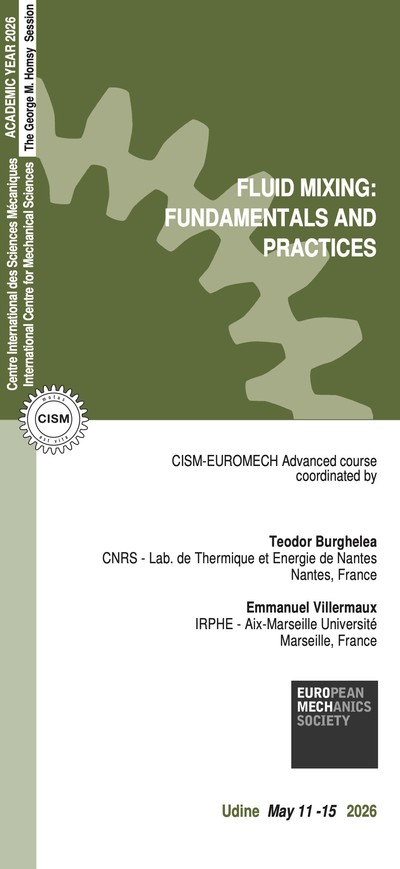K. Naumenko, H. Altenbach: Modeling High Temperature Materials Behavior for Structural Analysis, Part I: Continuum Mech-anics Foundations and Constitutive Models (2016), Part II: Solution Procedures and Structural Analysis Examples (2018), Springer.
Altenbach, H.; Öchsner, A. (eds., 2014): Plasticity of Pressure-Sensitive Materials, Springer.
E.A. de Souza Neto, D. Peric, D.R.J. Owen (2008) Computational Methods for Plasticity - Theory and Applications, Wiley.
R. de Borst, M.A. Crisfield, J.J.C. Remmers, C.V. Verhoosel (2012): Non-linear Finite Element Analysis of Solids and Structures, 2nd Ed., Wiley.
Talreja, R., and Singh C.V. (2012): Damage and Failure of Composite Materials, Cambridge University Press.
Talreja, R., J. Varna (eds, 2016): Modeling Damage, Fatigue and Failure of Composite Materials, Woodhead Publ.
Talreja, R. (2014): Assessment of the Fundamentals of Failure Theories for Composite Materials, Comp Sc & Techn, 105, 190-201.
Talreja, R. (2016): Physical Modelling of Failure in Composites, Phil Trans Royal Society A, 374.
Teodosiu, C., Hu, Z. (1998): Microstructure in the continuum modeling of plastic anisotropy. In: Cartensen, JV et al. (eds.) Proc. Risø Int. Symp. Mat. Sci., Roskilde, Denmark. Risø Nat. Lab., 149–168.
Barlat, F., Ferreira Duarte, J., Gracio, J.J., Lopes, A.B., Rauch, E.F. (2003): Int. J. Plasticity 19, 1215-1244.
Barlat, F., Gracio, J.J., Lee, M.G., Rauch, E.F., Vincze, G. (2011): Int. J. Plasticity 27, 1309–1327.
Skrzypek, J., Ganczarski, A. (eds., 2015): Mechanics of Anisotropic Materials, Springer.
Skrzypek, J., Ganczarski, A. (2016): Constraints on the applicability range of pressure-sensitive yield/failure criteria: strong orthotropy or transverse isotropy, Acta Mechanica, 227, 2275-2304.
5 lectures on: Creep and damage of materials at elevated temperatures.
Components of structures that are subjected to high temperatures, but moderate loads are affected by creep deformations. Various models for simulation of such structures at quasi-static and cyclic loading conditions are discussed. As an example, a phase mixture model for simulating tempered martensitic steels i is presented.
6 lectures on: Anisotropic plasticity during non-proportional loading.
Modeling of the plastic behavior during non-proportional loading using continuum theories with a top-down multi-scale approach to incorporate the influence of relevant microstructural features. Numerical implementation in finite element codes are discussed and illustrated with forming simulation results for advanced high strength steels.
6 lectures on: Computational plasticity.
Integration of plasticity models for finite loading steps, consistent tangent operator, volumetric locking for fully developed plastic flow, discretisation methods for elasto-plastic solids (finite elements, meshless methods, isogeometric finite element analysis).
5 lectures on: Anisotropic plasticity during non-proportional loading.
Description of anisotropy influence on limit criteria (yield/failure) for modern homogeneous metallic alloys. Anisotropy of limit criteria, critical comparison of explicit vs. implicit approaches, discussion on physical interpretation and convexity of implicit approach are discussed.
4 lectures on: Mechanisms based modelling of failure in composite materials accounting for manufacturing defects.
Five basic failure modes in unidirectional composites, Statistical simulation of fibre distribution irregularities and matrix voids, Energy based failure criteria and hierarchical failure progression, Failure under combined loading.
6 lectures on: Microstructure related aspects of fracture and damage of engineering materials.
Basic aspects of fracture mechanics; stresses and strains ahead of cracks and notches; linear-elastic and elasto-plastic fracture mechanics; stress intensity factors; fracture and damage criteria; measurement of critical quantities (KIc, J-integral); influence of microstructure on fracture behaviour; fractography and observation methods; examples for fracture and damage of engineering materials.
The registration fee is 600.00 Euro + VAT*, where applicable (bank charges are not included). The registration fee includes a complimentary bag, four fixed menu buffet lunches (on Friday upon request), hot beverages, downloadable lecture notes and wi-fi internet access.
Applicants must apply at least one month before the beginning of the course. Application forms should be sent on-line through the following web site: http://www.cism.it. A message of confirmation will be sent to accepted participants. Applicants requiring assistance with the registration should contact the secretariat at the following email address cism@cism.it.
Applicants may cancel their course registration and receive a full refund by notifying CISM Secretariat in writing (by email to cism@cism.it) no later than two weeks prior to the start of the course.
Cancellation requests received during the two weeks prior to the start of the course will be charged a 50.00 Euro handling fee. Incorrect payments are also subject to a 50.00 Euro handling fee.
A limited number of participants from universities and research centres who are not supported by their own institutions can be offered lodging and/or board, if available, in a reasonably priced hotel or student guest house.
Requests should be sent to CISM Secretariat by March 4, 2020 along with the applicant's curriculum and a letter of recommendation by the head of the department or a supervisor confirming that the institute cannot provide funding. Preference will be given to applicants from countries that sponsor CISM.
Information about travel and accommodation is available on the web site www.cism.it, or can be mailed upon request.
* Italian VAT is 22%.





